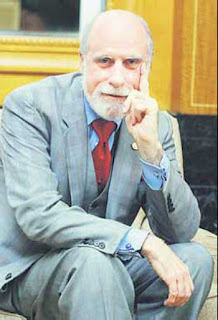 Internet pioneer Dr Vinton Cerf also talks about a merging between TV and the Net.
Internet pioneer Dr Vinton Cerf also talks about a merging between TV and the Net. KUALA LUMPUR: By Ridzwan A. Rahim
Space is the next frontier for the Internet, says Internet pioneer Dr Vinton Cerf.
The Google vice-president and chief Internet evangelist, revealed that he was working on the Interplanetary Internet, a project of the Nasa Jet Propulsion Lab that aims to extend the Internet into outer space for planet-to-planet communications.
"The project has been going on for about 10 years now and requires some significant development in the new protocols in addition to TCP/IP," he told the New Straits Times at the World Congress on Information Technology (WCIT), referring to the Internet's common language.
Those protocols, he said, were now stable and were being standardised in the Consultative Committee for Space Data System, a group of international space agencies working together to standardise communications in space.
The group will start doing space-based testing of the protocols at the end of this year using Nasa's Deep Impact spacecraft. This will be followed by testing on a space station which Cerf expects to take place next year.
"If those tests are successful, we will offer these protocols with no constraints whatsoever and hope that all the space agencies will use them.
"If they do, every mission launched, whether its manned or unmanned, will have the ability to communicate with each other."
Cerf is widely known as the "father of the Internet", although it is a title he rejects.
In 1969, while at University California, Los Angeles, Cerf and two fellow graduate students, Bob Kahn and Leonard Klienrock, took the first crucial step of hooking up a computer to a switch in a military-commissioned project known as Arpanet, the predecessor of the global Internet.
Decades later, a new set of protocols called DTN, which stands for Delay and Disruption Tolerance Networking, had to be invented in order to make interplanetary communications possible. It is different from TCP/IP.
"When we originally started this work, we thought we could use the standard Internet protocols but we quickly discovered that they wouldn't work very well.
"For one thing, it takes quite a long time for radio signals to propagate back and forth between the planets because the distances are so big. Between Earth and Mars, for example, the one-way propagation time at the speed of light is between three to 20 minutes.
"It's not like a phone call; when you say hello, the person on the other end cannot hear you say that for three minutes or maybe as much as 20 minutes - at the speed of light."
Cerf said the goal was not to "build a big interplanetary network and hope somebody will use it".
"It simply means that when I launch a mission, if there are previous assets from other missions, or my own, up there still, I can make use of them to support my mission. So in an interesting way, over time we will accumulate an interplanetary backbone of communication using the standard protocols."
Cerf also spoke of a merging between TV and the Internet. He said by 2035, through a technology called IPTV, it would be viable to deliver an hour's worth of TV content through the Internet in just 16 seconds.
"People are going to download the video and play it back whenever they want it, just like the iPod."
Internet Protocol Television will also open up an exciting new form of advertising that is not disruptive, unlike the commercials on conventional television.
In Cerf's version of IPTV, the images in the field of view can be sensitised so that if there is an item of interest, viewers can click on it and find out more about the item.
Calling it a "quite doable" technology, Cerf said conventional broadcast, cable and satellite TV would have to adapt to the idea of people wanting to download and play back their shows.
No comments:
Post a Comment